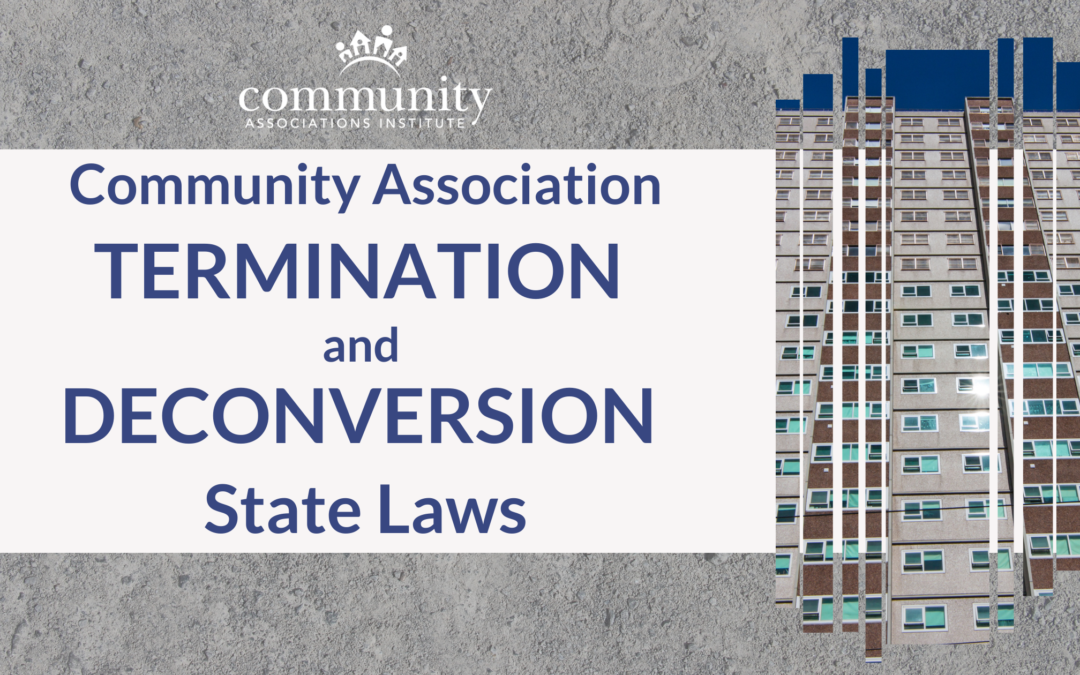With many community association buildings in the U.S. beginning to age beyond the point of regular repairs, the discussion about association termination procedures is becoming more common. Condominium termination and deconversion is the process of bulk-selling a condominium property to a third party to be turned into rentals. According to CAI’s Guiding Principles for Community Association Governing Documents: A Resource For Lawyers, the standard termination approval process of a condominium building requires a vote of 80% of the unit owners.
Many states include the owner approval voting percentage in their state condominium or common interest community act approved by the Uniform Law Commission and American Bar Association. Other states opt to have the community association’s declaration establish this percentage.
It is important for association boards and owners to understand which laws govern how their association can be terminated or deconverted. Terminating an association is one of the biggest decisions an association will make in its lifetime, and it is critical that proper procedures are taken.
“Terminating a condominium is not for the faint of heart. In addition to ensuring fairness for both unit owners who wish to leave and unit owners who wish to remain, it is essential to ensure fairness in the allocation of proceeds among the unit owners,” says Robert M. Diamond, a fellow in CAI’s College of Community Association Lawyers (CCAL). “Most of the applicable statutes are insufficiently nuanced and do not address the infinite possible situations causing and resulting from termination. Successfully terminating a condominium requires well-organized association leadership and a creative and detail-oriented attorney. Due to physical and economic obsolescence, we will be terminating many more condominiums in the near future, so we need to be educated on how best to do it.”
Uniform Act Termination Provisions
The Uniform Law Commission establishes uniform and model acts on numerous subjects that improve the laws of commerce, family and domestic relations, real estate transactions, trusts and estates, alternative dispute resolution, and much more. The following are the two leading uniform acts governing the community association housing model:
- Uniform Condominium Act (UCA). In 1978, the American Bar Association and Uniform Law Commission approved the UCA, which was adopted by 14 states: Alabama, Arizona, Kentucky, Maine, Minnesota, Missouri, Nebraska, New Mexico, Pennsylvania, Rhode Island, Texas, Virginia, Washington, and West Virginia. The UCA contains comprehensive provisions for creation, management, and termination of condominium associations, including point-of-sale consumer protection.
- Uniform Common Interest Ownership Act (UCIOA). In 1982, the Uniform Law Commission established the UCIOA, which has since been revised in 1994 and 2008, and amended in 2014. The American Bar Association approved this act in 2009. UCIOA is a basic statute for creating, managing, and terminating condominium, planned community, and real estate cooperatives. States enacted either the 1982 or 2008 version of the UCIOA. Alaska, Colorado, Minnesota, Nevada, and West Virginia adopted the 1982 version, and Connecticut, Delaware, Vermont, and Washington adopted the 2008 version.
Section 2-118, termination of a condominium or common interest community, in both uniform acts, states that a condominium or common interest community may be terminated only by agreement of at least 80% of unit owners, or any larger percentage the declaration specifies, and with any other approvals required by the declaration. The declaration may specify a smaller percentage only if all of the units in the associations are restricted exclusively to nonresidential uses.
The voting percentage of unit owners required to approve an association’s termination or deconversion ranges between 67% to 100% in about half of state statutes. The other half adopted laws to allow an association’s declaration to determine the voting percentage required for an association to terminate.
CAI advocates for the adoption of the UCIOA. In those states where it is not possible to adopt the act in its entirety, CAI supports and recommends consideration of appropriate portions of the law. Consult with your association’s attorney if considering a termination.
>>Learn about your state’s condominium termination statute and voting percentage. Or, find additional state laws regulating community associations.



